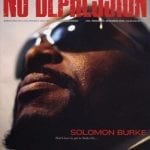Graham Lindsey – He’s About a Mover
“When I’m writing it’s the same thing as when I’m listening to a record. I’m listening to myself,” says Graham Lindsey. “Finally giving myself a chance to sit down and shut up. You never know what is going to come out.”
As with death, it’s best not to be prepared. Hell Under The Skullbones is Lindsey’s second album of haunting songs about death and romance laced with pessimism. They sound familiar and borrow ready-made archetypes, but what makes them immediately gripping is the way Lindsey frames his blues. His sweet melodies inevitably disguise a bleak soul.
Strip out the lyrics, and “Burn Me Down” is the type of gentle love song that wouldn’t sound out of place on Neil Young’s Harvest Moon. But Lindsey is more subversive; behind the tunefulness is a lover’s plea of the darkest kind. To see you one more time, he’d dismember himself, he’d drink gasoline, he’d die. “I would never be so proud,” he sings.
Hell Under The Skullbones arrives three years after Famous Anonymous Wilderness, Lindsey’s knockout debut. That album stood out for its loner vibe, with Lindsey’s guitar and voice delivering brutally eloquent songs from an outsider looking in.
Skullbones moves the band closer. They are responsible for the ambiance, which is mysterious and continually shifting. On “Just Like Dust”, Lindsey walks through what sounds like a forest at midnight; electronic sounds gnarl from under the brush, a hellhound barks, and he sings that his spirit is floating away. The band can also go off on a tear: On “Elly Bly”, master instrumentalist Greg Leisz’s dobro whips to the front in a to-the-death kiss-off. “One of us must leave this bed alive,” he warns Elly Bly. “I’ll never kiss your lips again.”
“I definitely didn’t want to re-create the first album,” Lindsey says. Wilderness had an unusual backstory: Lindsey was an avowed rambler, trying out various locales — New Orleans, Brooklyn, the rural plains of Lincoln, Nebraska — before returning to Wisconsin, his home state. In his travels, he was searching for a musical identity; as it turned out, the inevitable isolation served him well.
“It works for me,” he says. “The more people you’ve got in a close space, the more homogenous everything is. The element of individuality is lost.”
In September, Lindsey and his fiancee moved yet again, to Montana in a rental cabin outside Bozeman. After playing dates there with Wayne Hancock, he found the town’s energy and people welcoming. “I moved here on a whim. It’s the hometown I never grew up in,” he says.
Skullbones producer Steve Deutsch, whose contacts were responsible for cameos from Van Dyke Parks and Captain Beefheart guitarist Moris Tepper, also provided a home for the album on his own label, Spacebar Recordings. “All the smaller labels, all the mid-size labels and all the major labels are all battling the same problems right now,” Lindsey says. “No one seems to be making any long-term investments. Everyone’s running for the buck at this point, which is too bad.”
Now that he’s settled in a new home, the traveling begins. He’ll play the Netherlands at the end of this year, his first steps outside the United States. “Proportionally speaking, the audience is much bigger at this point there than in the U.S.,” he notes. “Not discounting the folks here that appreciate my music, but I think the culture here is so much more temperamental and flighty. That’s just the way of the walk.”




